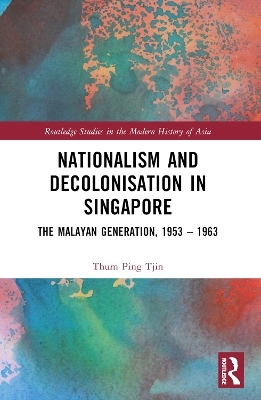
Nationalism and Decolonisation in Singapore
The Malayan Generation, 1953 – 1963
Seiten
2024
Routledge (Verlag)
978-1-032-48424-2 (ISBN)
Routledge (Verlag)
978-1-032-48424-2 (ISBN)
- Lieferbar (Termin unbekannt)
- Versandkostenfrei innerhalb Deutschlands
- Auch auf Rechnung
- Verfügbarkeit in der Filiale vor Ort prüfen
- Artikel merken
This book analyses Singapore’s decolonisation movement between 1953-63 and important unresolved conflicts in Singaporean society. It will be of interest to researchers of Southeast Asian History and Politics, and those interested in decolonisation, nationalism, identity, and the politics of race, class, and language.
Nationalism and Decolonisation in Singapore analyses Singapore’s decolonisation movement between 1953 and 1963 and provides a framework to understand the deepest and most important unresolved conflicts in Singaporean society.
This book demonstrates how these conflicts stem from four unresolved schisms dating from the decolonisation period: race, class, language, and the meaning of self-determination. The author argues that these schisms drove the events of decolonisation, the creation of Malaysia, and Singapore’s separation and continue to actively shape Singapore today. Using contemporary English- and Chinese-language sources from a wide array of perspectives, as well as numerous declassified official documents, this book provides a new approach to the most formative period of Singapore history. It explains in detail the different ideologies, institutions, and conflicts which shaped Singaporean politics and society during decolonisation. In particular, the book focuses on the leaders of the main groups which most heavily influenced Singapore’s anti-colonial nationalism – the Chinesespeaking, the working class, and left-wing intellectuals. It looks at Singapore in the context of global movements of nationalism, socialism, and decolonisation and provides a framework which can offer insight into similar attempts by postcolonial governments to construct new nation-states from plural societies.
A novel study of Singapore’s independence struggle that incorporates and analyses multiple linguistic, socioeconomic, and political viewpoints, the book will be of interest to researchers of Southeast Asian history and politics and those interested in decolonisation, nationalism, identity, and the politics of race, class, and language.
Nationalism and Decolonisation in Singapore analyses Singapore’s decolonisation movement between 1953 and 1963 and provides a framework to understand the deepest and most important unresolved conflicts in Singaporean society.
This book demonstrates how these conflicts stem from four unresolved schisms dating from the decolonisation period: race, class, language, and the meaning of self-determination. The author argues that these schisms drove the events of decolonisation, the creation of Malaysia, and Singapore’s separation and continue to actively shape Singapore today. Using contemporary English- and Chinese-language sources from a wide array of perspectives, as well as numerous declassified official documents, this book provides a new approach to the most formative period of Singapore history. It explains in detail the different ideologies, institutions, and conflicts which shaped Singaporean politics and society during decolonisation. In particular, the book focuses on the leaders of the main groups which most heavily influenced Singapore’s anti-colonial nationalism – the Chinesespeaking, the working class, and left-wing intellectuals. It looks at Singapore in the context of global movements of nationalism, socialism, and decolonisation and provides a framework which can offer insight into similar attempts by postcolonial governments to construct new nation-states from plural societies.
A novel study of Singapore’s independence struggle that incorporates and analyses multiple linguistic, socioeconomic, and political viewpoints, the book will be of interest to researchers of Southeast Asian history and politics and those interested in decolonisation, nationalism, identity, and the politics of race, class, and language.
Thum Ping Tjin is a historian and Visiting Fellow at Hertford College, University of Oxford, UK, and also the founder and Managing Director of New Naratif.
1: Why Malayan? 2: The Origins of Malayan Nationalism; 3: Mass Movements and Education, 1953–55; 4: Political Parties, 1954–55; 5: Associationalism, 1955–56; 6: Transitional Politics, 1955–57; 7: Electoral Politics, 1957–61; 8: The Meaning of Self-Determination, 1961–63; 9: Legacies; Index
| Erscheinungsdatum | 06.09.2023 |
|---|---|
| Reihe/Serie | Routledge Studies in the Modern History of Asia |
| Zusatzinfo | 1 Tables, black and white; 7 Halftones, black and white; 7 Illustrations, black and white |
| Verlagsort | London |
| Sprache | englisch |
| Maße | 156 x 234 mm |
| Gewicht | 453 g |
| Themenwelt | Geschichte ► Allgemeine Geschichte ► Neuzeit (bis 1918) |
| Geschichte ► Allgemeine Geschichte ► Zeitgeschichte | |
| Geisteswissenschaften ► Geschichte ► Regional- / Ländergeschichte | |
| Sozialwissenschaften ► Soziologie ► Spezielle Soziologien | |
| ISBN-10 | 1-032-48424-1 / 1032484241 |
| ISBN-13 | 978-1-032-48424-2 / 9781032484242 |
| Zustand | Neuware |
| Haben Sie eine Frage zum Produkt? |
Mehr entdecken
aus dem Bereich
aus dem Bereich
Europa 1848/49 und der Kampf für eine neue Welt
Buch | Hardcover (2023)
DVA (Verlag)
48,00 €
Giordano Bruno - ein ketzerisches Leben
Buch | Hardcover (2024)
C.H.Beck (Verlag)
29,90 €


